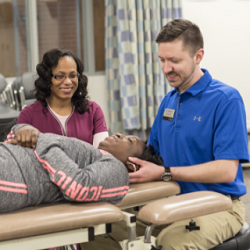What is a Physical Therapist Assistant and Aide?
There are many things that a Physical Therapist Assistant and Aide must do throughout the day on the job.
Not only is office work involved in this career but helping patients in the exam room is part of the job as well.
As a Physical Therapist Assistant or a Physical Therapist Aide, you will work with others in a physical therapy team, such as the Physical Therapist and Rehabilitation team, to help patients get back to normal.
In this job, you’ll spend a lot of time with patients ensuring their bodies are working as they should.
Duties
A Physical Therapist Assistant and Aide will likely have several tasks to do at once.
There could be a patient at the front desk, and one in the exam room.
But a Physical Therapist Assistant or a Physical Therapist Aide will need to find time to help both.
Some of the other tasks that are the responsibility of Physical Therapist Assistants and Aides include:
- Observing and assessing patients
- Teaching patients and families about physical therapy procedures
- Therapeutic massage
- Planning treatment for patients
- Visiting patients in their homes
- Manually manipulating patients bodies
Salary
With a career as a Physical Therapist Assistant or a Physical Therapist Aide, you can expect to make a salary close to $61,180 a year on average.
This career will boast quite the salary for those who have a lot of experience and education.
Physical Therapist Assistants and Physical Therapists Aides at the top of their careers can make close to $80,170 a year.
However, the salary for new Physical Therapist Assistants and Aides is closer to $37,280 to begin.
Having credentials, specializations, and hands-on knowledge of the field will grant Physical Therapist Assistants and Aides more opportunities for career and salary growth.
Annually National Average Salary: $65,860
Average Annual Salary by State
| State | Avg. Annual Salary |
|---|---|
| Alabama | $59,480 |
| Alaska | $67,360 |
| Arizona | $60,700 |
| Arkansas | $62,620 |
| California | $77,700 |
| Colorado | $65,470 |
| Connecticut | $65,400 |
| Delaware | $66,310 |
| District of Columbia | $65,780 |
| Florida | $67,500 |
| Georgia | $71,830 |
| Hawaii | $60,470 |
| Idaho | $61,000 |
| Illinois | $67,170 |
| Indiana | $63,240 |
| Iowa | $57,990 |
| Kansas | $61,720 |
| Kentucky | $58,990 |
| Louisiana | $57,400 |
| Maine | $61,240 |
| Maryland | $68,870 |
| Massachusetts | $71,320 |
| Michigan | $58,940 |
| Minnesota | $62,380 |
| Mississippi | $62,130 |
| Missouri | $62,750 |
| Montana | $60,240 |
| Nebraska | $56,920 |
| Nevada | $80,360 |
| New Hampshire | $66,200 |
| New Jersey | $65,920 |
| New Mexico | $58,150 |
| New York | $59,510 |
| North Carolina | $65,770 |
| North Dakota | $51,470 |
| Ohio | $64,280 |
| Oklahoma | $62,150 |
| Oregon | $66,560 |
| Pennsylvania | $59,640 |
| Rhode Island | $65,050 |
| South Carolina | $67,230 |
| South Dakota | $52,140 |
| Tennessee | $63,220 |
| Texas | $72,060 |
| Utah | $60,030 |
| Vermont | $66,720 |
| Virginia | $65,970 |
| Washington | $67,610 |
| West Virginia | $61,740 |
| Wisconsin | $63,530 |
| Wyoming | $60,690 |
| Puerto Rico | $26,150 |
Annual Average Salary: Top 5 States
The top earning state in the field is Nevada, where the average salary is $80,360.
These are the top 5 earning states in the field:
* Employment conditions in your area may vary.
How to Become a Physical Therapist Assistant and Aide
Step 1 Earn an Associates Degree
Formal Education is a requirement for Physical Therapist Assistants and Aides, and an Associates degree is the best program to enter.
This is because more and more medical teams are requiring Physical Therapist Assistants and Aides to have at least an Associates degree before they get hired.
Having a degree shows employers that you are competent in the field and that you have the experience to do the job.
In the average Physical Therapist Assistant Associates degree program, you can find courses such as:
- Principles of Musculoskeletal
- Physical Therapy Practices
- Physical Therapy Practice for Special Populations
- Anatomy and Physiology
- Medical Terminology
- Evidence-based Practices
You should also expect to have clinical labs and an externship in most Physical Therapist Assistant and Aide programs.
There are some Physical Therapist Aide programs online and offered in trade schools that provide entry-level education that can take up to 18 months.
Step 2 Become Licensed
After you have earned a degree or a certificate, most Physical Therapist Assistants and Aides are required to become licensed in the state they want to work in.
There are only two states that do not require their Physical Therapist Assistants and Aides to have licensure, and those states are Hawaii and California.
All other prospective Physical Therapist Assistants and Aides must pass the National Physical Therapy exam.
The National Physical Therapy exam covers many topics and can be taken online or in person.
Some of the areas to study for this exam are:
- Musculoskeletal system
- Lymphatic System
- System Interactions
- Neuromuscular System
- Equipment, Devices, and Technologies
- Therapeutic Modalities
- Safety and Protection
Once you pass this exam, you will be a licensed Physical Therapist Assistant or Aide.
Students can retake the test three times before they will need to wait a year to reapply.
The cost of the exam is $100.
Step 3 Gain Experience
Having experience in physical therapy is the best way to get better in this career.
Most Physical Therapist Assistants and Aides will have had some experience working with clients through their education program.
This provides hands-on knowledge, but there are other ways to become a master in the field of physical therapy, including:
- Volunteering at rehab centers
- Working as a home health aide
- Attending seminars
- Shadow senior Physical Therapists Assistants
- Shadow Physical Therapists
There are careers beyond working as a Physical Therapist Assistant and Aide, and you will need to have on the job knowledge to accept most of them.
This is a great way to get your head start in the medical field.
Step 4 Continue Your Education
While you are exploring your career as a Physical Therapist Assistant or a Physical Therapist Aide, you may realize that there is a certain specialization that you lean toward.
This could be one of the following niches:
- People with disabilities
- The elderly
- Athletes
- Pediatrics
If you have found that you enjoy working with one set of patients over another, then you can find many educational programs and certification programs to complement that niche.
Some Physical Therapist Assistants and Aides earn a Bachelor’s degree and go on to work in many other areas of the medical field.
Though it’s possible to earn a salary with a broad career as a Physical Therapist Assistant or Aide, finding a niche will allow for larger wages and promotions.
Popular Programs
Education
Becoming educated as a Physical Therapist Assistant and Physical Therapist Aide is crucial to success.
Most Physical Therapist Assistants earn an Associate’s degree or work through a one-year program to earn a certificate.
An Associate’s degree can take 2 years or more, depending on if the student is full-time or part-time.
There are many Associate’s degree programs for aspiring Physical Therapist Assistants and Aides, and most of them will require clinical labs and an externship in order to graduate.
You can expect to learn a lot about math and science in a Physical Therapist Assistant and Aide program.
The other courses that you can find in this type of program include:
- Biomechanics
- Anatomy and Physiology
- Kinesiology
- Neuroscience
- Clinical Pathology
- Ethics and Values in Medical Care
- Communications
- Behavioral Science
With classroom learning comes clinical labs, as well as possible externships.
These externships can be through the program or through a local hospital or physical therapist’s office.
The important factor to remember is that you must get permission before assuming you will get credit for your externship.
Now, if you are looking to work as a Physical Therapist Aide, you may not need to earn any formal education beyond a high school diploma.
Some of the types of tasks you can expect to have with a career as a Physical Therapist Aide include:
- Sanitizing and cleaning after patients
- Clerical and administrative responsibilities
Most Physical Therapist Aides will receive on the job training and education, so a degree isn’t necessary.
For those who earn an Associate’s degree, it’s likely you will find a job as a Physical Therapist Assistant, which is a step up from a Physical Therapist Aide.
If you are the type of person who wants to earn an education or your employer requires that you gain a certificate as a Physical Therapist Aide, there are some programs online and on campuses that take about one year to complete.
In a Physical Therapist Aide program, you will take courses that may include:
- Medical Terminology
- Physical and Occupational Therapy
- Exercise and Mobility Training
Often, a Physical Therapist Aide certificate program will offer some training through on the job experience and clinical lab work.
Video About The Career
Licensing and Certification
Most states in the United States require that Physical Therapists Assistants have a license in order to work.
There are some regulations for Physical Therapist Aides, but it varies by state and location.
In order to be eligible for licensure as a Physical Therapist Assistant, you will need to have an Associate’s degree from an accredited program.
The National Physical Therapy Examination, given by the Federation of State Boards of Physical Therapy, is a computer-based exam that will allow you to become a licensed and registered Physical Therapist Assistant.
It’s possible to take this exam online, as well as through testing centers across the country.
There are specific times for these exams, so contact your local Department of Licensing and Regulatory Affairs for more information.
The National Physical Therapy Assistant Exam has several sections, including areas on:
- Body systems such as:
- Cardiovascular
- Musculoskeletal
- Neuromuscular
- Metabolic
- Gastrointestinal
- Lymphatic
- Equipment and devices
- Therapeutic modalities
- Professional responsibilities
- Research and evidence-based practices
The state in which you will work determines the application fee as well as when you can take the exam.
If your employer requires that you earn a certification as a Physical Therapist Aide, one from the American Medical Certification Association will work great.
In order to be eligible for the American Medical Certification Association Physical Therapist Aide certification, you will need to:
- Be at least 18 years of age
- Have graduated from a training program or
- Have a minimum of one-year experience or
This certification can be earned by taking a 100-question exam, which can take around two hours to complete.
This exam will cover a variety of areas, including subjects like:
- Patient prep and positioning
- Law and ethics
- Administrative duties
- Patient care
- Safety and infection control
Earning this certification will demonstrate that you are competent in your career and that employers can trust you to do your job correctly.
Both the licensure for a Physical Therapist Assistant and the certification for a Physical Therapist Aide must be reapplied every two years to ensure validity.
Average Training Program Duration: 2-4 Years
It shouldn’t take too long to become a Physical Therapist Assistant or a Physical Therapist Aide.
However, if you are looking to become certified, it can take a couple of years of hands-on knowledge to apply.
Licensure to become a Physical Therapist Assistant requires at least an Associates degree to apply, which takes around two years to finish.
The Physical Therapist Aide certification requires at least one year of experience in the field.
It can take anywhere from 1 to 2 years to have the experience to become certified as a Physical Therapist Assistant or Aide.
Job Outlook
Job opportunities for Physical Therapists Assistants will likely grow around 35 percent over the next ten years.
For Physical Therapist Aides, the growth is not as much, but still a lot at 25 percent.
Both careers will likely be a major necessity in the future, due to the aging baby boomer population and the need for physical therapy.
Many facilities are utilizing Physical Therapist Assistants and Aides to help patients instead of employing Physical Therapists.
Some of the best places to find a career as a Physical Therapist Assistant and Aide are:
- Nursing homes
- Hospitals
- Home healthcare services
- Outpatient facilities
Physical Therapist Assistants and Aides working in larger communities will likely find higher career prospects.
Earning higher education and credentials in this field can also provide promotions and job openings.
Employment Growth Projection: 32%
2020
2030
That's a higher than average projected growth of 44,900
Should You Become a Physical Therapist Assistant or Physical Therapist Aide?
Overall Satisfaction: Medium

Working as a Physical Therapist Assistant or a Physical Therapist Aide can be a rewarding, yet challenging career.
There isn’t much upward mobility in this career without further education, but the home/work-life balance is good for this job.
Expect to have more flexibility in your schedule with this career more than others in the medical field.
Most Physical Therapist Assistants and Aides work a typical 9-5 workweek.
This career is best for those who like working in fast-paced jobs with many things to do at once.
Average Salary: High

Having a career as a Physical Therapist Assistant or a Physical Therapist Aide means that you will make about $61,180 a year on average.
Those who are just beginning their career as a Physical Therapist Assistant or Physical Therapist Aide can expect to make closer to $37,280.
With many years of experience and certification, a Physical Therapist Assistant or Aide can make almost $80,170 in some areas.
Working in larger populations with bigger hospitals or medical facilities will likely provide higher wages.
Job Growth Outlook: High

For those looking to become a Physical Therapist Assistant or a Physical Therapist Aide, finding job opportunities over the next several years should become easier.
The career of a Physical Therapist Assistant will grow around 35 percent over the next decade, which is much faster than most careers.
For Physical Therapist Aides, the career will grow over 25 percent, which is also a lot more than many other careers.
There will likely be a higher demand for physical therapy in the coming years, which would explain the sudden increase in career opportunities.
Education Duration: 2-4 Years

Most employers and states require that Physical Therapist Assistants and Aides have at least a two-year degree in order to gain employment.
An Associate’s degree can be earned at local community colleges, universities, and even online.
When pursuing an online program, make sure that it is accredited with the Commission on Accreditation in Physical Therapy Association.
It’s also important to make sure that clinical labs and externships get done in person to obtain hands-on experience.
Most education programs take around two years to finish, however for those interested in a Bachelor’s degree, that can take another 2 to four years.
Personal Skills Needed

In order to work as a Physical Therapist Assistant or Aide, you should have knowledge of the medical field, and be willing to help others.
Other skills to gain before becoming a Physical Therapist Assistant or Physical Therapist Aide are:
- Communication skills
- Ability to work as a team
- Listening skills
- Attention to detail
- Empathy and compassion
- Assertiveness
- Multitasking skills
- Physical stamina
- Mental strength
- Manual dexterity
- Computer skills
- Time management skills
- Leadership skills
- Organizational skills
- Math and science knowledge
- Interpersonal skills
Frequently Asked Questions
How much does a Physical Therapist Assistant and Aide make?
On average as a Physical Therapist Assistant or a Physical Therapist Aide, you can take home around $61,180 a year in salary.
When you are just starting your career as a Physical Therapist or Aide, you will likely find wages closer to $37,280 to begin.
However, after several years of experience and certifications, a Physical Therapist Assistant and a Physical Therapist Aide can make more money.
Most Physical Therapist Assistants and Aides at the top of their careers will make close to $80,170 a year.
How long does it take to become a Physical Therapist Assistant and Aide?
To gain the proper education for this career, you will need to at least earn an Associate’s degree in most states.
This requirement is due to the seriousness of the career since you will be working to help people in a medical setting.
There are some programs that can be done online or at trade schools that take less than two years, but be wary of ones that don’t provide clinical labs or externships.
These may not be accredited, and also may not provide the right education needed to work as a Physical Therapist Assistant and Aide.
What does a Physical Therapist Assistant and Aide do?
There are many duties that a Physical Therapist Assistant and a Physical Therapist Aide must do throughout the workday.
Some of the types of things that you can expect to do in this career include:
- Assessing patients
- Taking vitals
- Assisting patients with manipulating their bodies
- Speaking with Physical Therapists and other medical team members
- Entering information into the database
A lot of the day will consist of talking with patients and trying to determine the best course of action for their treatment.
What is the demand for Physical Therapist Assistants and Aides?
There will likely always be a need for this career, especially with the increase in physical therapy as a treatment plan for illness and injury.
Over the next decade, this career will grow about 35 percent, which is a lot more than many other careers in the medical field.
More people are becoming interested in physical therapy rather than medications in order to heal from injury and illnesses, hence the necessity for more Physical Therapist Assistants and Aides.
Also, the responsibilities of a Physical Therapist Assistant and a Physical Therapist Aide will continue to grow as it is easier to employ them over Physical Therapists.
How much does it cost to become a Physical Therapist Assistant and Aide?
Chances are that if you are planning to work as a Physical Therapist Assistant or a Physical Therapist Aide, you will need to earn an Associate’s degree.
Most Associates degrees in the United States can be earned at community colleges or universities across the country and online.
The average Associate’s degree ranges from around $10,000 to $15,000 depending on the type of degree program as well as where you earn the degree.
For those interested in earning a Bachelor’s degree, these can be gained for around $35,000.
 Physical Therapist Assistant Info by State
Physical Therapist Assistant Info by State

- Alabama
- Alaska
- Arizona
- Arkansas
- California
- Colorado
- Connecticut
- Delaware
- Florida
- Georgia
- Hawaii
- Idaho
- Illinois
- Indiana
- Iowa
- Kansas
- Kentucky
- Louisiana
- Maine
- Maryland
- Massachusetts
- Michigan
- Minnesota
- Mississippi
- Missouri
- Montana
- Nebraska
- Nevada
- New Hampshire
- New Jersey
- New Mexico
- New York
- North Carolina
- North Dakota
- Ohio
- Oklahoma
- Oregon
- Pennsylvania
- Rhode Island
- South Carolina
- South Dakota
- Tennessee
- Texas
- Utah
- Vermont
- Virginia
- Washington
- West Virginia
- Wisconsin
- Wyoming
Physical Therapist Assistant Resources
- 14 Pros and Cons of Being a Physical Therapist Assistant
- How Long Does it Take to Become a Physical Therapist Aide?
- How Much Does a Physical Therapist Aide Job Pay an Hour?
- Is There a Demand for Physical Therapist Aides?
- Online Physical Therapist Aide Schools: Can You Study Online?
- Physical Therapist Aide Certification Requirements by State
- Physical Therapist Aide VS Physical Therapist Assistant: What’s the Difference?
- Physical Therapist Aide VS Physician Assistant: Which One is Right for You?
- Physical Therapist Aide: 5 Things to Know Before Becoming One
- The School Costs for Becoming a Physical Therapist Aide
- What Is a Physical Therapist Aide?
More Medical Careers
| Career | |
|---|---|
 | Certified Nursing Assistant Working as a Certified Nursing Assistant is an entry-level role that will give you hands-on experience when you are ready to take the next step in your medical career. |
 | Dental Assistant Dental assistants help dentists to provide patient care, keep records, and care for the dental equipment. |
 | Dental Hygienist Dental hygienists take care of cleaning teeth to promote hygiene and help avoid cavities and gum problems. |
 | Dialysis Technician Dialysis technicians maintain and monitor dialysis equipment, and also act as primary caregivers for patients undergoing dialysis treatment. |
 | Dog Groomer Dog groomers attend to grooming dogs, usually at dog salons or big pet-related chain stores. |
 | Healthcare Administrator Healthcare administrators – also known as healthcare executives or health services managers – are responsible for the planning, direction, and coordination of medical and health services. |
 | Home Health Aide Home health aides provide home care to individuals who require assistance in their day-to-day living. |
 | Licensed Practical Nurse (LPN) Licensed Practical Nurses provide basic nursing care to patients and work with Registered Nurses and Doctors. |
 | Medical Assistant Medical assistants support the work of physicians, nurses, and other health professionals. |
 | Medical Biller and Coder Medical billers and coders manage, organize, and code various health information data. |
 | Medical Technologist Medical laboratory technologists collect bodily samples and conduct tests to analyze those samples. |
 | Medical Transcriptionist Medical transcriptionists go over voice recordings to convert them into written texts. |
 | Nutritionist As a Nutritionist, you’ll be tasked with creating meal plans, counseling, and understanding dietary restrictions for all types of clients. |
 | Patient Access Representative The work involves helping people to orient themselves to the space and everything that is going on. |
 | Patient Care Technician Patient care techs work directly with patients helping them with daily activities and assist the medical staff by measuring and monitoring the patients' vital signs among other tasks. |
 | Pharmacy Technician Pharmacy technicians provide patients with medications through prescription or over the counter. |
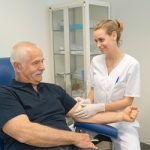 | Phlebotomist As a Phlebotomist, it will be your responsibility to take blood samples from patients and send them to the lab for further testing. |
 | Professional Recovery Coach A professional recovery coach is a life coach who works with someone during their addiction recovery process. |
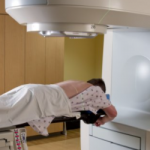 | Radiation Therapist Allied health provisional who specializes in radiation oncology treatments. |
 | Registered Health Information Technician Registered Health Information Technician (RHIT) help store and verify accuracy of health records as well as analyze patient data. |
 | Registered Nurse (RN) Registered Nurses provide hands-on patient care in various settings, mainly hospitals, and clinics. |
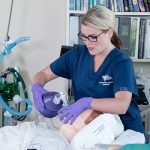 | Respiratory Therapist Respiratory therapists treat and care for patients who experience breathing difficulties. |
 | Sterile Processing Technician A sterile processing technician is a healthcare professional who is responsible for preparing, sterilizing, maintaining, packaging, and storing medical tools and equipment used in surgical and other medical procedures. |
 | Surgical Technologist Surgical technologists – also known as operating room techs – prepare operating rooms and assist doctors and nurses during surgical procedures. |
 | Vet Office Manager Veterinary office managers work to make sure that the daily operations run smoothly and efficiently at veterinary hospitals or veterinary clinics. |
 | Veterinary Assistant Veterinary Assistants work closely with Veterinarians to handle routine animal care. |
 | Veterinary Technician Veterinary Technicians assist veterinarians as well as diagnosing and treating animals, mostly in private clinics. |
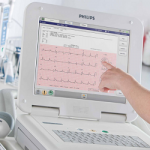 | EKG Technician EKG technicians test and monitor the cardiovascular system. |
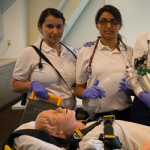 | EMT Trained emergency medical technician that arrives at the scene to provide medical services such as resuscitation. |
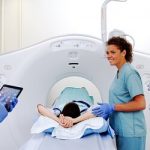 | MRI Technologist MRI Technologists use a machine to scan the body and create a detailed image of the inside for doctors to analyze. |
 | Optician Opticians are technicians and salespersons at the same time who spends most of their day talking to customers, reading prescriptions written by doctors, and dispensing glasses and lenses. |
 | Ultrasound Technician Ultrasound technicians aid physicians in monitoring and diagnosing patients through the use of ultrasonic imaging technology. |
 | X-Ray Technician X-Ray Technicians are medical imaging professionals who use technology to visualize the inside of our bodies. |
